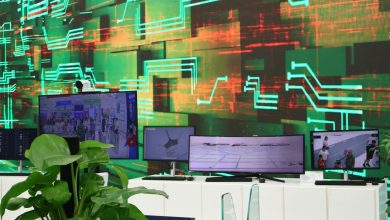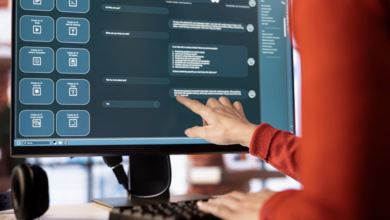
In the past, an entrepreneur’s success was often tied to their postcode. Whether in London, Silicon Valley or Berlin, launching a globally ambitious business typically required being physically close to investors, accelerators or an international airport.
Today, this is no longer the case. The rise of AI-powered businesses is removing many of the traditional barriers to entrepreneurship, changing how startups are built, operated and scaled – and redrawing the global map of opportunity in the process.
Just as the internet opened up access to knowledge and communication, AI is now doing the same for business capabilities globally. But as exciting as this shift is, it’s also raising new questions – about governance, access and the future of work.
Borderless entrepreneurship is becoming the norm
Building a business traditionally required physical infrastructure: office space, servers and often proximity to customers or regulators. In the modern business landscape, a laptop and an internet connection are often all that’s needed. Entrepreneurs can register a company in one country, bank in another and sell to customers just about anywhere.
This borderless model has been supercharged by AI. Founders can automate tasks like customer service, marketing and analytics, allowing them to scale rapidly without a large workforce. Language translation models remove linguistic barriers. AI-driven legal and compliance tools simplify expansion into new markets. Business itself is becoming more “modular” – with AI acting as a universal adaptor between systems, languages and laws.
As this trend accelerates, we are seeing a new kind of entrepreneur emerge: one who is agile, digital-first and comfortable operating in multiple jurisdictions at the same time. These founders are less concerned with the location of their headquarters, and more focused on where they can build the most resilient, flexible operations.
AI is democratising access to global markets
One of the most powerful things about AI is its potential to level the playing field. Startups in underrepresented regions now have access to cutting-edge tools that were once reserved for large enterprises. When combined with digital infrastructure that supports remote company formation and management, it’s now easier than ever to build globally.
Among UK SMEs, adoption has surged in just a few years. In 2022, only 15% of SMEs were using AI. But by early 2025, that figure had climbed to around 60%, making the UK one of the most AI-forward SME economies in Europe. This rapid shift has been driven by the accessibility of tools like chatbots, no-code platforms and generative AI models.
More importantly, adoption is translating into real business impact. According to the Sage SME survey, 90% of small businesses using AI said it had improved their productivity – whether by automating routine tasks, speeding up analysis or freeing teams to focus on strategy.
For entrepreneurs in developing or emerging economies, this access can be particularly transformative. Rather than outsourcing to expensive consultants or waiting for funding, founders can use AI to build viable businesses and reach global audiences on their own terms.
But as AI moves into the centre of entrepreneurship, the systems around it need to evolve too. Digital identity, regulatory compliance, taxation and intellectual property protections are just a few of the areas that require modernisation. For governments, the challenge is how to support innovation without stifling it – and how to protect citizens without creating artificial borders.
That’s why international collaboration matters more than ever. If borderless businesses are the future, we need shared standards around AI use, ethical frameworks and global operations.
Rethinking what “a job” looks like
As AI continues to transform business operations, it is also reshaping the future of work. Tasks that were once outsourced to freelancers or employees – from bookkeeping to copywriting – are increasingly being handled by AI. For entrepreneurs, this means they can stay lean and agile. For workers, it means adapting to a world where the nature of employment is more fluid.
But it’s not just about jobs being replaced – it’s about new types of work being created. The rise of AI-powered businesses is enabling access to a new ecosystem of AI trainers, prompt engineers, digital compliance experts and hybrid roles that blend human oversight with machine execution. These roles often move beyond national borders, with digital nomads and remote teams collaborating from all corners of the globe.
This evolution also challenges the traditional link between work and place. A recent study by Public First estimates that around 165,000 British citizens are now living and working abroad as digital nomads – collectively earning over £5.2 billion annually while doing so.
Governments are now grappling with how to tax, support and regulate workers who are no longer bound by location. As more professionals operate across jurisdictions, we will likely see new models of remote work governance – ones that prioritise flexibility, fairness and global mobility.
A new entrepreneurial mindset in an AI-first world
The rise of AI-powered businesses isn’t just changing the tools we use – it’s reshaping the mindset of entrepreneurs themselves. Founders today are approaching problem-solving with radically different assumptions than even five years ago. Instead of asking “How do I build this?” they’re now asking, “What can I automate? What can I train an AI to do for me?” This shift in thinking is leading to leaner startups with broader ambition.
We’re also seeing a rise in entrepreneurial resilience and adaptability. In a world where tools and platforms evolve weekly, successful founders are those who stay curious, keep learning and treat technology not as a shortcut, but as a collaborator. They’re becoming systems thinkers, able to design workflows where humans and machines each play to their strengths.
Perhaps most importantly, the AI-first mindset is allowing entrepreneurs to dream bigger. Freed from many of the traditional resource constraints, founders are tackling larger, more complex problems, with the belief that scalable, intelligent systems can help unlock new solutions.
The future belongs to globally-minded founders
In the coming years, we will see a surge in startups that are “born global” by design. These businesses will be digital-first, AI-powered and legally structured to operate across multiple jurisdictions from day one. Their founders will look beyond national borders, seeking partners, investors and customers wherever the opportunity is strongest.
For UK entrepreneurs, this moment is both a challenge and an opportunity. Post-Brexit, access to EU markets has become more complex, but digital tools and AI make it easier than ever to overcome such hurdles. Building with a global mindset from the outset is the new normal.




